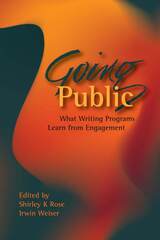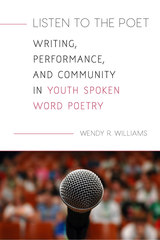2 books about Language arts (Secondary)

Going Public
What Writing Programs Learn from Engagement
Shirley Rose
Utah State University Press, 2010
An important new resource for WPA preparation courses in rhetoric and composition PhD programs. In Going Public, Rose and Weiser moderate a discussion of the role of the writing program vis-a-vis the engagement movement, the service learning movement, and current interest in public discourse/civic rhetoric among scholars of rhetoric and composition. This is a thoughtful collection on the ways that engagement-focused programs may be changing conceptions of WPA identity.
As institutions begin to include more explicit engagement with citizen and stakeholder communities as an element of their mission, writing program administrators find themselves with an opportunity to articulate the ways in which writing program goals and purposes significantly contribute to achieving these new institutional goals. Writing programs are typically situated at points where students make the transition from community to college (e.g., first-year composition) or from college to community (e.g. professional writing), and are already dedicated to developing literacies that are critically needed in communities.
In Going Public, Rose and Weiser locate their discussion in the context of three current conversations in higher education: 1) the engagement movement, particularly as this movement serves to address and respond to calls for greater accountability to broader publics; 2) recent interest in public discourse/civic rhetoric among scholars of rhetorical history and contemporary rhetorical theory; 3) the service learning movement in higher education, especially the ways in which college and university writing programs have contributed to this movement.
While there have been a number of publications describing service-learning and community leadership programs, most of these focus on curricular elements and address administrative issues, if at all, primarily from a curricular perspective. The emphasis of the current book is on the ways that engagement-focused programs change conceptions of WPA identity. Going Public, then, is not only a significant contribution to the scholarly literature, but also supplies an important new resource for WPA preparation courses in rhetoric and composition PhD programs.
In Going Public, Rose and Weiser locate their discussion in the context of three current conversations in higher education: 1) the engagement movement, particularly as this movement serves to address and respond to calls for greater accountability to broader publics; 2) recent interest in public discourse/civic rhetoric among scholars of rhetorical history and contemporary rhetorical theory; 3) the service learning movement in higher education, especially the ways in which college and university writing programs have contributed to this movement.
While there have been a number of publications describing service-learning and community leadership programs, most of these focus on curricular elements and address administrative issues, if at all, primarily from a curricular perspective. The emphasis of the current book is on the ways that engagement-focused programs change conceptions of WPA identity. Going Public, then, is not only a significant contribution to the scholarly literature, but also supplies an important new resource for WPA preparation courses in rhetoric and composition PhD programs.
[more]

Listen to the Poet
Writing, Performance, and Community in Youth Spoken Word Poetry
Wendy R. Williams
University of Massachusetts Press, 2018
Youth spoken word poetry groups are on the rise in the United States, offering safe spaces for young people to write and perform. These diverse groups encourage members to share their lived experiences, decry injustices, and imagine a better future. At a time when students may find writing in school alienating and formulaic, composing in these poetry groups can be refreshingly relevant and exciting.
Listen to the Poet investigates two Arizona spoken word poetry groups—a community group and a high school club—that are both part of the same youth organization. Exploring the writing lives and poetry of several members, Wendy R. Williams takes readers inside a writing workshop and poetry slam and reveals that schools have much to learn about writing, performance, community, and authorship from groups like these and from youth writers themselves.
Listen to the Poet investigates two Arizona spoken word poetry groups—a community group and a high school club—that are both part of the same youth organization. Exploring the writing lives and poetry of several members, Wendy R. Williams takes readers inside a writing workshop and poetry slam and reveals that schools have much to learn about writing, performance, community, and authorship from groups like these and from youth writers themselves.
[more]
READERS
Browse our collection.
PUBLISHERS
See BiblioVault's publisher services.
STUDENT SERVICES
Files for college accessibility offices.
UChicago Accessibility Resources
home | accessibility | search | about | contact us
BiblioVault ® 2001 - 2024
The University of Chicago Press









